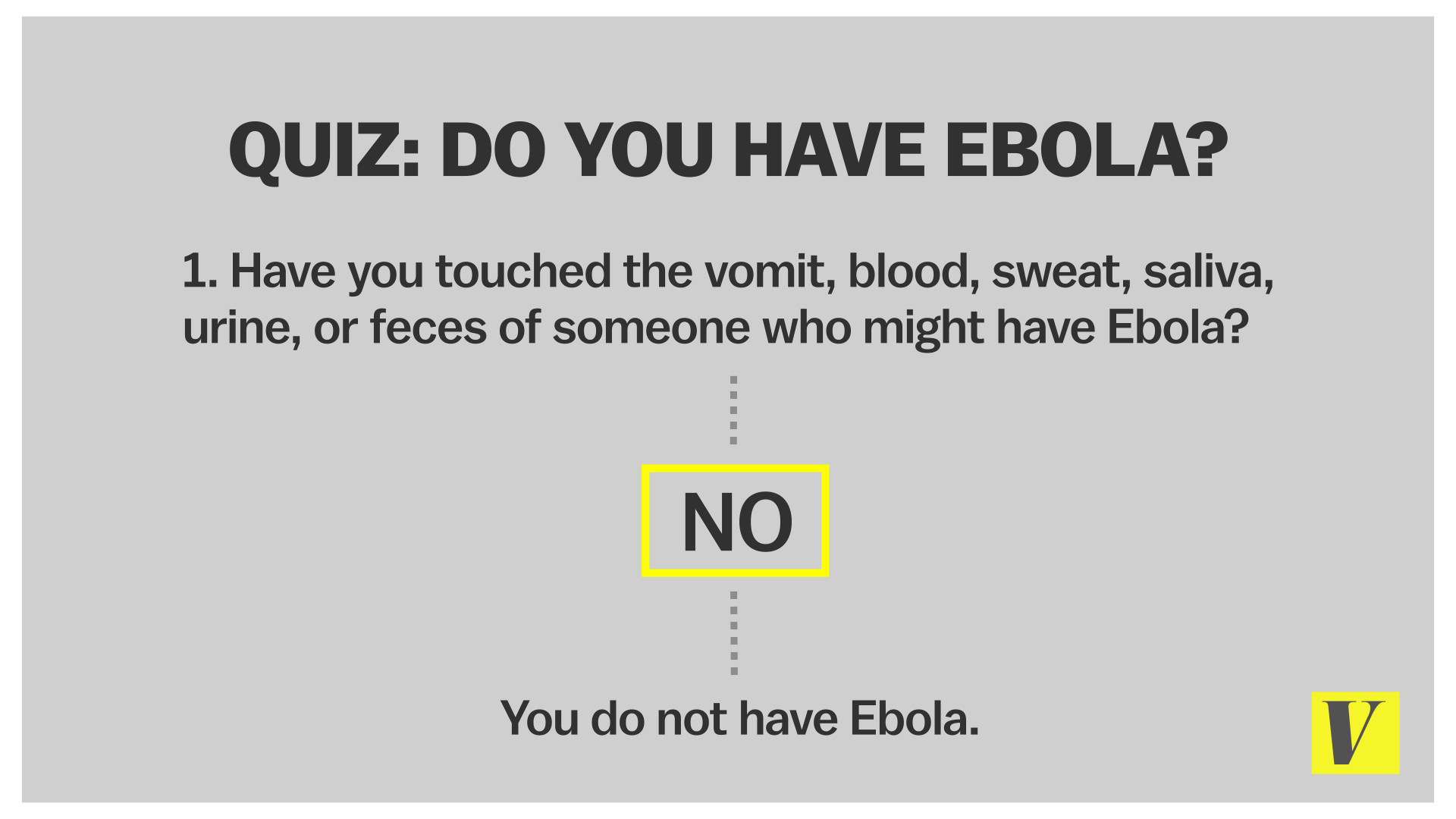
The first thing to do is to calm down.
Ebola is terrifying. But it's not likely to kill you, or to spread widely in the United States. What's scary - and hyped - about Ebola isn't what makes it dangerous.
Ebola is a hemorrhagic fever. It kills about half of those who contract it. It sometimes, though not always, leads to uncontrollable bleeding. But it's difficult to contract. The only way to catch Ebola is to have direct contact with the bodily fluids - vomit, sweat, blood, feces, urine or saliva - of someone who has Ebola and has begun showing symptoms.
Modern public-health systems can manage diseases that travel through bodily fluids. The techniques are laborious, but known. You isolate those who have contracted the disease, or might have contracted it. You find out who's been near them. You screen them for the disease. You isolate anyone who shows symptoms. You do this until the disease is stamped out. It works. And modern public-health systems know how to do it. not all public-heath systems are modern
But not all public-heath systems are modern. This Ebola outbreak is concentrated in extremely poor countries with extremely weak health systems, like Guinea, Sierra Leone, Liberia, and the Democratic Republic of Congo. Those countries lack the basic infrastructure - trained health workers, protective gear, isolation wards - needed to stop the disease. 'The tipping point was when there were more patients than isolation beds,' Dr. Thomas Frieden, the director of the Centers for Disease Control and Prevention, told me.
When Ebola has edged into countries with stronger health systems, it's been stopped cold. Cases have been discovered in Senegal and Nigeria, but the countries managed to stop the spread of the disease. The Nigeria experience is particularly encouraging. As the New York Times reports:
After the first patient - a dying Liberian-American - flew into Lagos on July 20, Ebola spread to 20 other people there and in a smaller city, Port Harcourt.
They have all now died or recovered, and the cure rate - 60 percent - was unusually high for an African outbreak.
Meanwhile, local health workers paid 18,500 face-to-face visits to repeatedly take the temperatures of nearly 900 people who had contact with them. The last confirmed case was detected Aug. 31, and virtually all contacts have passed the 21-day incubation period without falling ill.
On average, Guinea spends $32 on health care per-person, per-year. Liberia spends $65. Nigeria spends $94.
The United States spends $8,895.
That money buys trained health workers, disease investigators, isolation wards, fever screening, protective gear, and much more. That money buys advanced hospitals all across the country, and labs that can quickly test for the disease, and the ability to do contact tracing and follow-up visits on a tremendous scale. That money also buys public-health officials with long experience combatting infectious diseases - both here and in other countries. ' There are still bodies being left overnight on the street'
It's not just money, though. It's daily practices, both inside and outside of hospitals. In West Africa, Ebola is mainly spreading through unsafe caregiving burial practices. ' There are still bodies being left overnight on the street,' Frieden said.
Those aren't problems in the United States. Bodies aren't left in the street overnight. People who die of Ebola won't be buried in public ceremonies where the corpse is touched by the grievers. American health-care workers have the gear and the training to provide care safely.
Moreover, a big part of what's been so deadly about the Ebola outbreak in West Africa is that the health-care systems are so overloaded - and due to poor sanitation, so dangerous to be in - that huge numbers of people are dying from non-Ebola causes. 'West Africa will see much more suffering and many more deaths during childbirth and from malaria, tuberculosis, HIV-AIDS, enteric and respiratory illnesses, diabetes, cancer, cardiovascular disease, and mental health during and after the Ebola epidemic,' wrote disease researchers Jeremy Farrar, of the Wellcome Trust, and Peter Piot, of the London School of Hygiene and Tropical Medicine in the New England Journal of Medicine.
The problem with Ebola is stopping it in Africa, where cases continue to rise exponentially, and where health systems are already overwhelmed . The CDC estimates that 1.4 million people could be infected by January if swift action isn't taken to scale up the response. The medical and political consequences of that would be vast. 'This is more than a health crisis. This is a growing threat to regional and global security,' President Obama said at the United Nations.
That said, while there can and will be cases of Ebola in the United States, the disease will be stopped here. Ebola is dangerous when it can overwhelm a health-care system, but it's nowhere close to being able to overwhelm the US health-care system. So if you live in America, worry about heart disease, or traffic accidents, or gun violence instead. Ebola is terrifying, but it's not likely to kill you.
Post By http://www.vox.com/2014/9/30/6875459/calm-down-youre-not-going-to-get-ebola
0 comments Blogger 0 Facebook
Post a Comment